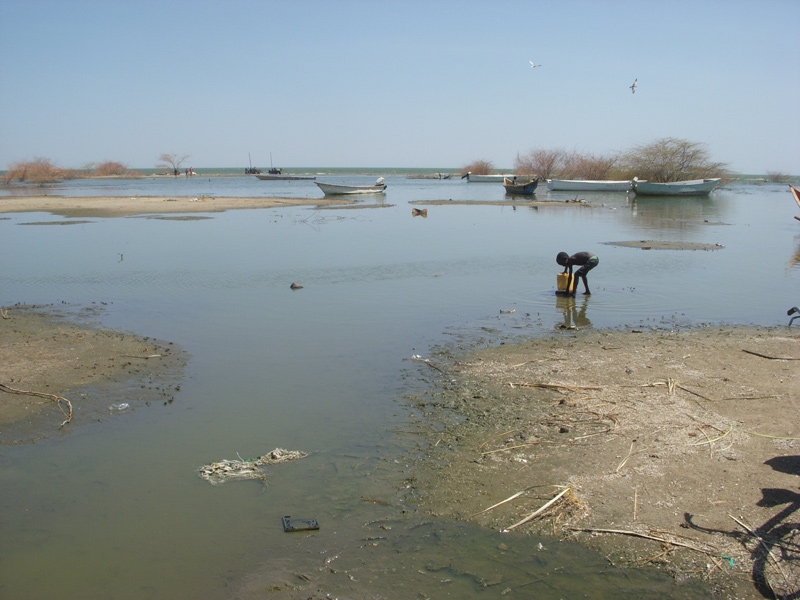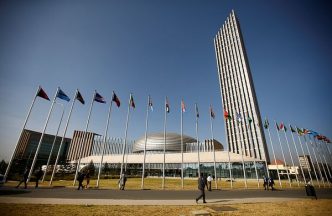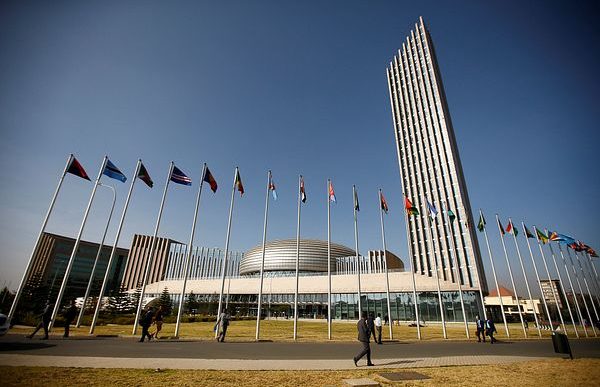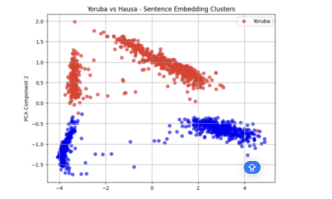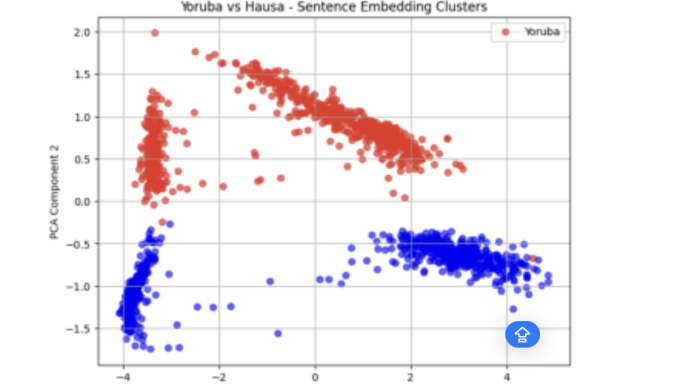Table of Contents Show
Abstract
This study investigates the potential of artificial intelligence to improve political conflict and cooperation in the Lake Chad Basin (LCB). The study is qualitative in nature and draws data from secondary sources. The findings revealed that Africa has been excluded from discussions on artificial intelligence at the global stage for a while, since Africa and African-based contexts were not considered when the earliest AI models were being developed. Despite this, artificial intelligence is becoming prevalent in Africa and, if used ethically, it has the potential to help combat conflict and foster cooperation in the Lake Chad Basin and other parts of Africa. However, the study concludes that there are often challenges related to data quality, ethical considerations, and governance framework on the deployment of artificial intelligence, not only in the Lake Chad Basin but across Africa. The study then recommends that stakeholders such as the African Union, the LCBC, member states, and international partners establish a regional AI-powered early warning system and should also foster collaboration and partnership to harness the potential of AI in promoting peace, stability, and development in the LCB.
Keywords: Africa, AI, AU, conflict, cooperation, Lake Chad Basin, LCB, LCBC
Background to the Study
The Lake Chad Basin (LCB) is a region of immense strategic importance, situated at the heart of Africa. Spanning across Chad, Nigeria, Cameroon, and Niger, the LCB is a vital economic and environmental hub, supporting the livelihoods of millions of people (Osanubi 2024). The region’s rich cultural heritage, diverse ecosystems, and significant natural resources have made it a focal point for regional development. The unique geography of the LCB has shaped the lives of its inhabitants, influencing their economic activities, social structures, and cultural practices. However, despite its potential, the region faces significant challenges that threaten its stability, as well as its development. In recent years, the region has been confronted with numerous challenges, including the Boko Haram insurgency, climate change, resource scarcity, and displacement of populations. These challenges have had devastating impacts on the LCB’s security, economy, and humanitarian situation, leading to widespread displacement, poverty, and human suffering. The Boko Haram insurgency has been a major driver of instability in the region, causing significant loss of life, displacement, and destruction of infrastructure, and the complex dynamics of the LCB require innovative solutions to address its unique needs. It is in this context that the study explores the potential of artificial intelligence (AI) in conflict prevention and cooperation.
The advent of AI has opened up new possibilities for addressing these complex challenges. AI models can analyse vast amounts of data, including satellite imagery and social media, to identify patterns and provide predictive insights that can enhance conflict prevention, mitigation, and resolution in the LCB. By understanding the historical context of conflicts, regional politics, and diplomacy, AI-driven solutions can be tailored to address the unique needs of the region.
The study aims to advance the body of knowledge on the potential for the application of AI to conflict prevention and cooperation in the LCB, while also highlighting the challenges and limitations of its deployment in the region. By examining the role of AI in promoting peace and stability in the LCB, the study seeks to provide a comprehensive understanding of how AI-driven solutions can be leveraged to support conflict prevention, mitigation, and resolution efforts in the region, taking into account the complex interplay between technological, political, environmental, and social factors.
Study Area
The LCB is located on the Sahelian part of West and Central Africa, by the southern edge of the Saharan Desert (Adewoye, Ukoha, and Okonkwo 2023, 40), and it cuts across northern Cameroon, western Chad, south-eastern Niger and north-eastern Nigeria (Sanusi 2024). The size of the area within the region covers 2,381635 km2, and its Conventional Basin, which is 427,500 km2 valued at 20% of the LCB area, spans 42% in Chad, 28% in Niger, 21% in Nigeria, and 9% in Cameroon. These countries also formed the Lake Chad Basin Commission (LCBC), under whose mandate the water and other natural resources of the Lake Chad Basin are managed.
Roughly 30 million people live in the LCB (Humanitarian Practice Network 2017; Osanubi 2024), and the region has long been a socio-economic and cultural melting pot that has witnessed a series of state-building from pre-colonial, colonial, and post-colonial periods (Umara 2018). It is home to several different ethnic groups, who are mostly farmers, each with their own unique culture and history. These ethnic groups, while they practise Islam, also have unique cultural adaptations to their specific societies. Groups like the Shuwa Arab, Kanuri, Hausa, Fulani, Buduma, Kotoko, Maba, and many others claim ownership and ancestral linkage to the region (Osanubi 2024).
Figure 1. The Map of the Lake Chad Basin
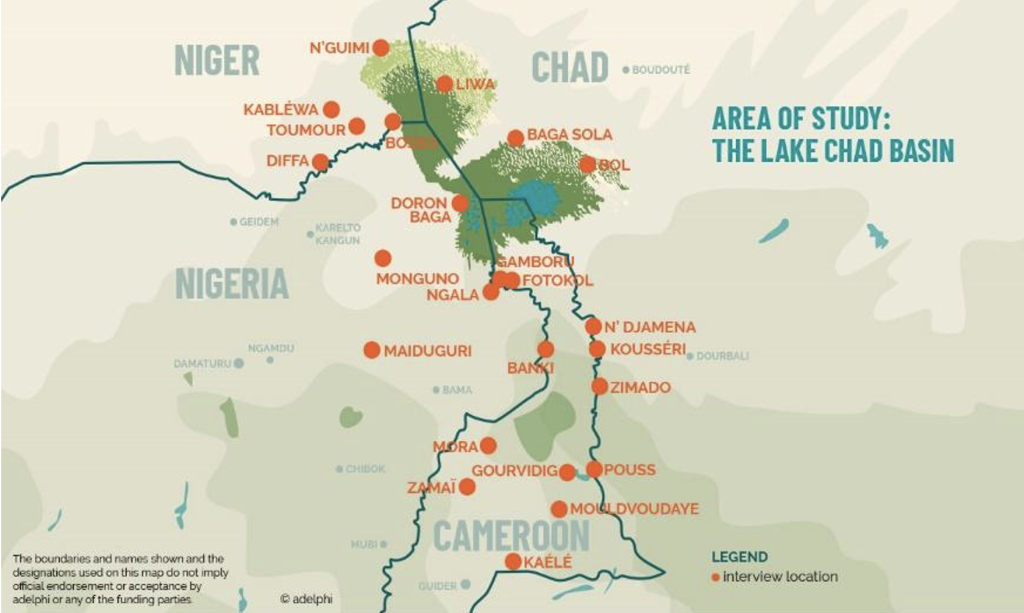
Source: Vivekananda et al., Shoring Up Stability, 23, figure 1.
Potential Application of Artificial Intelligence in Combatting Conflict and Fostering Cooperation in the Lake Chad Basin
The LCB is situated within a complex and dynamic landscape characterised by increasing tensions, climate change, and the natural resource and economic paradox (Adebola and Aniekwe 2022). These factors have contributed to significant humanitarian crises, displacement, and loss of life in the region (Osanubi 2024). The Boko Haram insurgency has been a major driver of conflict in the LCB, exacerbating existing tensions and competition over scarce resources. Climate change has further complicated the conflict dynamics, leading to intensified competition for resources such as water and land.
The application of AI offers a promising avenue for addressing the complex challenges facing the LCB. AI can significantly enhance conflict prevention and management in the region by analysing satellite imagery, social media, and historical trends to detect emerging threats in the region. The use of AI-powered platforms such as the Global Conflict Risk Index, which utilise machine learning algorithms to predict possible outbreaks of conflict, can also provide insights that inform conflict prevention and management strategies (Ndzana 2025). If done in a timely manner, AI can help assess security threats in the LCB and also enable proactive measures that could help prevent the outbreak of conflict involving its member states and violent non-state actors (VNSAs). To key into this, the LCBC and member states will have to integrate the AU Continental AI Strategy into their conflict mitigation, prevention, resolution, and plans of action.
A key benefit of AI in conflict prevention and management is its ability to identify potential flashpoints and areas of high risk, allowing for targeted interventions and resource allocation. AI can analyse large datasets to identify patterns and trends of conflict that may not be apparent to human analysts, providing a more detailed understanding of the complex dynamics of conflict in the LCB. The use of AI in early warning systems can also reduce the impact of conflict on local communities by enabling early response and mitigation efforts (Amani Africa 2025). AI can help inform the development of targeted interventions, such as food aid programmes of the Food and Agriculture Organisation (FAO) or the peacebuilding initiatives of the United Nations Development Programme (UNDP), by analysing data on food security, climate-related disasters, and population movements across national boundaries of the LCB states.
The LCBC and member states can leverage AI to analyse data on cross-border security threats like arms proliferation and identify potential areas of cooperation. The natural language processing (NLP) tools of AI can contribute to conflict resolution via diplomatic mediation by analysing negotiation patterns and advising leaders within the region. By analysing large datasets, AI can help identify potential areas of conflict and inform the development of targeted peacekeeping and military strategies of the Multinational Joint Task Force (MNJTF), the regional security outfit saddled with the task of combating Boko Haram and other VNSAs. This can enhance regional cooperation and peace-led efforts in the LCB by optimising surveillance systems, logistics, and decision-making processes (Ndzana 2025).
Effective application of AI in the LCB requires collaboration and partnership among stakeholders, including the African Union (AU), the LCBC, member states, and international partners. By pooling their resources and expertise, stakeholders can harness the potential of AI to promote peace, stability, and development in the LCB. The AU can provide strategic guidance and support, while the LCBC can facilitate regional coordination and cooperation. International partners can provide technical assistance, funding, and expertise to support the development and deployment of AI-powered solutions in regional centres and also in conflict-ravaged communities in the riparian states of the LBC.
Interdisciplinary Implications.
- Bridging Disciplinary Boundaries
The study bridges disciplinary boundaries by combining insights from multiple fields, including computer science, which provides the understanding of advanced analytical tools for conflict analysis and enables the identification of patterns and trends in conflict data; history, which provides valuable insights into the drivers of conflict in the region and highlights the importance of understanding the historical context of conflict; environmental science, which highlights the impact of environmental factors on conflict dynamics and underscores the need for sustainable and environmentally informed policies; international relations, which helps inform better understanding of conflict dynamics and regional security and highlights the importance of cooperation and diplomacy in preventing conflicts; and, lastly, public policy, which enables the development of effective policies for conflict prevention and regional cooperation and supports informed decision-making.
- Potential Applications in Nigerian Contexts
This study could enhance conflict prevention and early warning systems, which can help prevent violent conflict and promote peace and stability in the country. Secondly, it could help inform policy decisions on cooperation and security in the LCB, which can further help promote regional stability and cooperation, which will in turn help support sustainable development in Nigeria.
- Contributions to Understanding the Relationship between Technology and Society
The study could enhance conflict analysis and prevention by providing advanced analytical tools and enabling the identification of patterns and trends in conflict data. It may also inform policy decisions and support evidence-based policies by providing policymakers with valuable insights and data-driven recommendations.
Additionally, the study could support community-based initiatives for peacebuilding and development by empowering local communities to take ownership of peacebuilding efforts, promoting sustainable development.
- Resource Considerations for Implementing Similar Work in Low-Resource Settings
The resources required to adapt the study in low-resource settings include:
- Digital Access: Access to reliable internet, data storage, and computational resources, which can support the effective use of AI-driven solutions.
- Capacity building: Provide training and capacity-building programmes for local stakeholders, which can enhance their capacity to use AI-driven solutions effectively.
- Ethical guidelines: Establish clear guidelines for data collection, analysis, and use, which can ensure the responsible use of AI-driven solutions.
- Collaboration: Foster collaboration with regional organisations, governments, and local communities, which can promote effective implementation and sustainability of AI-driven solutions.
Methodology
The study employs a qualitative case study approach, utilising a desk review of secondary data from existing sources to examine the potential of AI applications on conflict and cooperation in the LCB. Data were collected from online and offline sources, including academic articles, reports, and policy documents related to AI applications in conflict resolution and cooperation. The collected data was thematically analysed, a qualitative research method that involves closely analysing data to identify common themes, ideas, subjects, and patterns of meanings that come up repeatedly. This approach allowed for a detailed examination of the potential benefits and limitations of AI models in conflict resolution and cooperation. The study uses a case study approach to examine the LCB as a specific context where AI models can be applied to enhance conflict resolution and foster cooperation. The analysis focuses on identifying the potential applications and limitations of AI models in addressing conflict and promoting cooperation in the region.
Ethical Considerations
The study recognises that the technical knowledge of AI is limited among stakeholders in Africa, which may lead to biases in the interpretation and application of AI models. It also acknowledges that resource limitations and accessibility challenges may affect the adoption and implementation of AI models in the LCB for its various activities, especially ones linked to conflict resolution and peaceful coexistence.
Recommendations and Conclusion
There are often challenges in the effectiveness of AI models because of the dependence on data quality, ethical considerations, and governance framework regulating AI’s deployment in Africa, and because Africa’s voice has previously been excluded from discussions on AI at various international fora. The effect of this exclusion is premised on the fact that Africa’s interests and African contexts were not seriously considered while AI models were being developed (Musoni 2024). Despite these challenges, there has been significant progress recorded in the evolution of AI, from traditional models to generative systems capable of creating, extensively exploring, and interpreting complex data (Azaroual 2024). AI has been able to present a new framework for understanding the causes and consequences of conflict and how cooperation can be fostered by leveraging big data, machine learning, and predictive analysis, which help in providing early warning systems, strengthening cooperation, and improving policy actions.
In Africa, AI is gradually making its way into technologies such as advanced surveillance systems and combat drones, which are deployed to fight organised crimes (Allen and Okpali 2022). The application of AI in issues of conflict and cooperation, as it affects the LCB, offers a promising solution to the complex challenges of conflict prevention and management in the region. By leveraging AI models, the AU, LCBC, and other stakeholders can enhance their ability to detect emerging threats, identify potential flashpoints, and develop targeted interventions. AI can also inform the development of peace support efforts and military strategies, optimise surveillance systems, and facilitate diplomatic mediation. The effective application of AI in the LCB requires collaboration and partnership among stakeholders, including the AU, the LCBC, member states, and international partners. By pooling their resources and expertise, stakeholders can harness the potential of AI to promote peace, stability, and development in the LCB. With AI-powered solutions, the region can better address the complex challenges of climate change, environmental degradation, and ongoing conflict, and work towards a more stable and prosperous future.
The study recommends that the AU, LCBC and their member states establish a regional, AI-powered early warning system to detect emerging threats and potential flashpoints and should also foster collaboration and partnership to harness the potential of AI in promoting peace, stability, and development in the LCB.
Acknowledgements
All thanks to Eledumare, the Source of All Knowledge, Known and Unknown. My appreciation goes to my mentors, Dr Chinasa T. Okolo and Mr Nelson Olanipekun and other facilitators. A big thank you to Habeeb Kolade, Ololade Faniyi, Khadijat Alade, and everyone on the Research Round team. You have all been wonderful. I must not forget my co-fellows in the African Governance Group, Dr Nufaisa G. Ahmed and Omokhose J. Ojebuovboh, and other fellows in the Cohort. You are all amazing. My appreciation goes to the sponsors of the fellowship. Special thanks to everyone who has worked and is still working tirelessly to see that peace returns to the riparian countries of the Lake Chad Basin.
References
Adebola, T. & Aniekwe, C. C. (2022, August 26). The Lake Chad Basin Region: Conflicts, crises and contemporary developments. School of Law, University of Aberdeen, UK. https://www.abdn.ac.uk/law/blog/the-lake-chad-basin-region-conflicts-crises-and-contemporary-developments/
Adewoye, A. R., Ukoha, P. A. & Okonkwo, S. J. (2023). Big Data and Artificial Intelligence development for climate-smart agriculture modelling of the Lake Chad Basin. Forum for Agriculture Research in Africa Research Report, 7 (6), 39-47. https://doi.org/10.59101/frr072306
Allen, N. & Okpali, I. (2022, April). Artificial Intelligence creeps on to the African battlefield. Nairobi Law Report Monthly. wathi.org/artificial-intelligence-creeps-on-to-the-african-battlefield-nairobi-law-montly-april-2022/
Amani Africa. 2025. Artificial Intelligence and its impacts on peace, security and governance. https://amaniafrica-et.org/artificial-intelligence-and-its-impact-on-peace-security-and-governance
AU (2024, July). Continental Artificial Intelligence Strategy: Harnessing AI for Africa’s development and prosperity. https://au.int/site/default/files/documents/44004-doc-EN_Continental_AI_Strategy_July_2024.pdf
Azaraoul, F. (2024, May 16). Artificial Intelligence in Africa: Challenges and opportunities. Policy Brief. PB-23/24. Policy Centre for the New South. https://www.policycenterma/publications/artificial-intelligence-africa-challenges-and-opportunities
HPN (2017). The Lake Chad Basin: An overlooked crisis? https://odihpn.org/magazine/lake-chad-basin-overlooked-crisis/
Musoni, M. (2024, January). Envisioning Africa’s AI governance landscape. European Centre for Development Policy Management. Brief Note No. 177. https://ecdpm.org/application/files/7017/0651/8711/Envisioning-Africs-AI-Governance-Landscape-in-2024-ECDPM-Briefing-Note
Ndzana, J. Y. N. (2025, March 26). The role of Artificial Intelligence on conflict prevention and management in Africa. ACCORD: Conflict and Resilience Monitor. https://www.accord.org.za/analysis/the-role-of-artificial-intelligence-in-conflict-prevention-and-management-in-africa/
Osanubi, S. A. K. (2024). Boko Haram insurgency and regional stability in the Lake Chad Basin. An unpublished MSc Dissertation submitted to the School of Postgraduate Studies, Federal University of Lafia, Nigeria.
Sanusi, S. A. (2024, August). Information vacuum and information disorder in conflicts zones: An exploration of the Lake Chad Basin. https://daidac.thecjid.org/information-vacuum-and-information-disorder-in-conflict-zonesan-exploration-of-thelake-chad-basin/
Umara, I. (2018). National interest and foreign policy option for Nigerians in the Central Africa Sub-Region. Kaduna: Joyce Graphic Printers and Publishers.
Vivekananda, Janani, Martin Wall, Chitra Nagarajan, Florence Sylvestre, and Oli Brown. 2019. Shoring Up Stability: Addressing Climate and Fragility Risks in the Lake Chad Region. adelphi research gemeinnützige GmbH. https://shoring-up-stability.org/wp-content/uploads/2019/06/Shoring-up-Stability.pdf
